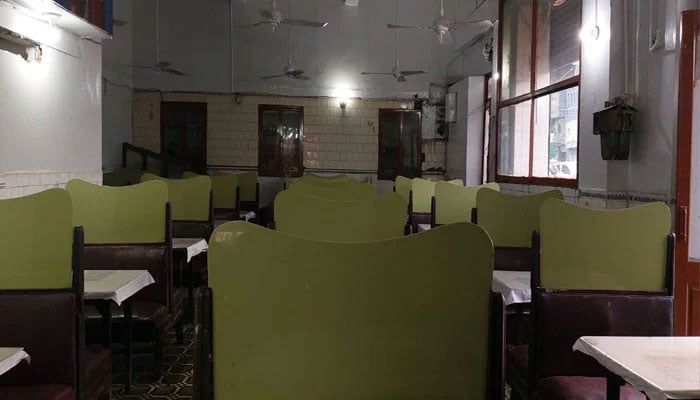Iranian cafes become a rare sight in Karachi
Every Iranian cafe is located at the corner of the road intersection
KARACHI: Have you ever been to Karachi and visited Irani cafes? If not, then you have missed that historic culture which made the metropolis — the city of light.
Karachi was a sensational city before the Partition too, its vibrant multicultural milieu was not the only reason that attracted tourists but also its evenings and gatherings. This trend of casual gathering became normal in the port city because of Irani cafes situated in different localities across Karachi.
What was so interesting about it? Well, Irani cafe culture is very different from other cafe scenes in the cosmopolitan city. They were the centres of progressive writers, trade union leaders, intellectuals and labourers. The uniqueness of these cafes can be observed today too. Every cafe is located at the corner of the road intersection.
The rationale to build this can be interpreted in many ways, however, one particular aspect as I have observed is that any person who travels by public transport can easily access this hotel as it is situated right at the corner. The infrastructure, norms and formalities not only let elite people enjoy the best of Iranian cuisine but normal people too. They are lawyers, students, broken heart lovers, penniless intellectuals and also mill owners and seths of Karachi who come and sit at the same tables and these cafes serve them equally.
There are only four Iranian cafes left in Karachi — Cafe Victory near Uni Plaza, Khairabad Tea Shop at Shaheen Complex, Cafe Darakhshan & Pehlvi at Sadder and Cafe Mubarak in Garden. Geo News tried to interview owners of all four, however, some of them didn't share stories because of several reasons. One of them is because they are Iranians and they fear trouble. However, Geo News engaged Cafe Victory and Khairabad Tea Shop.
Cafe Victory was built 55 years ago. The Chullu Kebab of this restaurant is their house special. The co-partner Abdul Hameed said, "Even after 55 years, we did not lose our customs. We cook Chullu Kabab without any South Asian spices, we serve it the way it was served 50 years ago. It's very hard to manage because of price inflation because everything we cook is in soya oil."
Like every wonderful story, there is a tragic present. This happened with Irani cafe culture too. These cafes are not popular today as they were in the 60s and 70s. We talked to multiple people who are either the owners of these cafes or were once before they sold them out to local people. None of them gave us a concrete reason for why Iranians are not investing in the food business even having a big market. Except for Abbas Ali, owner of one of the oldest functional Irani cafes, Khairabad Tea Shop.
Khairabad Tea Shop was opened in 1943. It is still standing on its feet and serving the great prawn pulao to everyone, however, Abbas Ali thinks it's now impossible to run this cafe anymore. "The owners are demanding hundreds of thousands of rupees for rent because of its prime location. We are demanding our Pagri amount (traditional rent arrangements system in Pakistan) which is so less that we can not open another cafe.
"This cafe was built before the Partition of India and my forefathers have invested sweat and blood into it. We are the pioneers of modern food culture in Karachi and they treat us like we are no one. This cafe is a legacy of 80 years, and yet we are not Pakistanis. My children were born here yet they are not allowed to open a bank account. Our four generations have passed serving this land and they are throwing us out."
A similar account was shared with us by other people too but they wanted to be low profile due to legal complications. In short, Karachi's heritage is on the verge of extinction and at the speed of this city, we are leaving our evening conversations, our roots, our customs and gatherings in these cafes far behind.
-
Security forces gun down 30 terrorists in multiple IBOs in KP: ISPR
-
MQM-P calls for new province in Sindh
-
US report validates Pakistan military edge over India: PM
-
Banned TTP poses serious threat to Pakistan security: UNSC panel
-
CM Afridi clarifies remarks on by-poll after ECP requests army deployment
-
Dubai sees 3.2m Pakistani passengers in 2025 as airport sets new milestone
-
Security forces kill 23 Indian proxy terrorists in KP's Kurram
-
Pakistan to construct island to boost oil exploration: report












